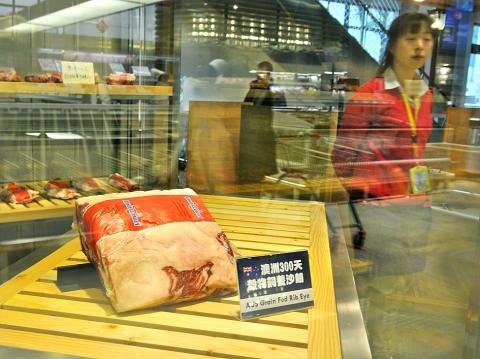The Taipei City Government’s Department of Environmental Protection yesterday said it would burn more than 6,700kg of US beef containing ractopamine residue tomorrow to ensure that confiscated beef would not reach consumers.
The confiscated US beef, totaling 6,771 kg, is the first batch of US beef containing the banned feed additive to be destroyed in Taipei in wake of recent inspections of beef products.
According to Kuo Kuo-shin (郭國鑫), a division chief at the department, the beef was confiscated from Taipei-based Shusen Corp, a major beef importer that provides beef to several steakhouse chains, including My Home Steak and Noble Family Steakhouses, and the beef products are now being stored by the city’s Department of Health.

Photo: CNA
The Department of Environmental Protection will burn the beef products tomorrow morning at Muzha Refuse Incineration Plant.
“Some consumers are concerned about the whereabouts of the confiscated beef products and worried that the beef would somehow appear in the markets again. Destroying the beef products is aimed at easing their concerns,” he said.
The Taipei City Government will be the first local government to destroy US beef products confiscated for containing the feed additive. Kuo said the fee for destroying the beef products was about NT$12,400 (US$422), and the importers would foot the bill.
Local city governments began inspections of US beef last month in the wake of recent disputes over the administration of President Ma Ying-jeou’s (馬英九) plan to partially lift the ban on ractopamine in US beef products.
In Taipei, the Department of Health has conducted spot checks at 11 major hypermarkets and supermarkets since last month, and found beef containing ractopamine at the Neihu branches of RT Mart and Carrefour, after which the two hypermarkets immediately pulled all US beef products off the shelves.
Taipei Food and Drug Division Director Chen Li-chi (陳立奇) said the Department of Health had fined Shusen Corp NT$60,000 for importing and selling meat products containing the additive, and that it would continue spot checks on the company and other beef importers to implement the zero-tolerance policy on beef containing ractopamine until the government finalized its decision on the ban.
Under current regulations, local importers that import products containing ractopamine residue are subject to a fine of between NT$60,000 and NT$6 million.
Kuo said the Department of Environmental Protection would continue to assist importers with handling the confiscated beef products, with incinerators in Muzha, Neihu and Beitou available for the burning of meat products.

A magnitude 4.9 earthquake struck off Tainan at 11:47am today, the Central Weather Administration (CWA) said. The hypocenter was 32.3km northeast of Tainan City Hall at a depth of 7.3km, CWA data showed. The intensity of the quake, which gauges the actual effect of a seismic event, measured 4 in Tainan and Chiayi County on Taiwan's seven-tier intensity scale, the data showed. The quake had an intensity of 3 in Chiayi City and County, and Yunlin County, while it was measured as 2 in Kaohsiung, Nantou County, Changhua County, Taitung County and offshore Penghu County, the data showed. There were no immediate reports of

Weather conditions across Taiwan are expected to remain stable today, but cloudy to rainy skies are expected from tomorrow onward due to increasing moisture in the atmosphere, according to the Central Weather Administration (CWA). Daytime highs today are expected to hit 25-27°C in western Taiwan and 22-24°C in the eastern counties of Yilan, Hualien, and Taitung, data on the CWA website indicated. After sunset, temperatures could drop to 16-17°C in most parts of Taiwan. For tomorrow, precipitation is likely in northern Taiwan as a cloud system moves in from China. Daytime temperatures are expected to hover around 25°C, the CWA said. Starting Monday, areas

A Taiwanese software developer has created a generative artificial intelligence (AI) model to help people use AI without exposing sensitive data, project head Huang Chung-hsiao (黃崇校) said yesterday. Huang, a 55-year-old coder leading a US-based team, said that concerns over data privacy and security in popular generative AIs such as ChatGPT and DeepSeek motivated him to develop a personal AI assistant named “Mei.” One of the biggest security flaws with cloud-based algorithms is that users are required to hand over personal information to access the service, giving developers the opportunity to mine user data, he said. For this reason, many government agencies and

Taiwan has recorded its first fatal case of Coxsackie B5 enterovirus in 10 years after a one-year-old boy from southern Taiwan died from complications early last month, the Centers for Disease Control (CDC) said yesterday. CDC spokesman Lo Yi-chun (羅一鈞) told a news conference that the child initially developed a fever and respiratory symptoms before experiencing seizures and loss of consciousness. The boy was diagnosed with acute encephalitis and admitted to intensive care, but his condition deteriorated rapidly, and he passed away on the sixth day of illness, Lo said. This also marks Taiwan’s third enterovirus-related death this year and the first severe